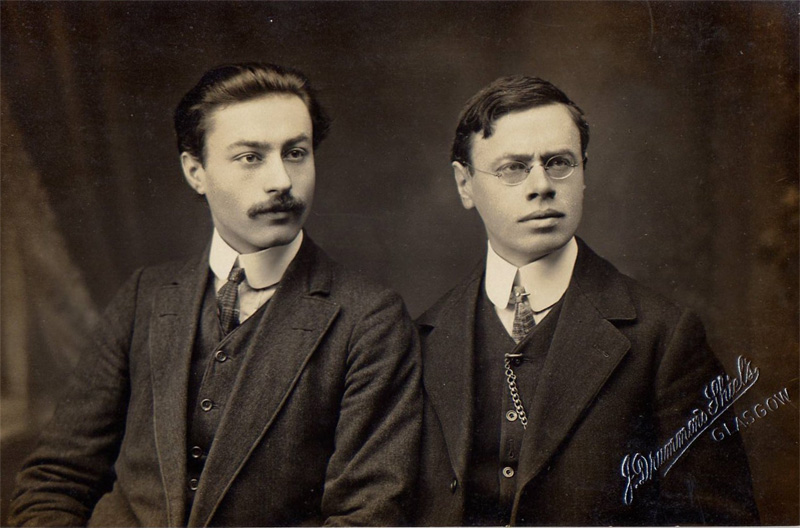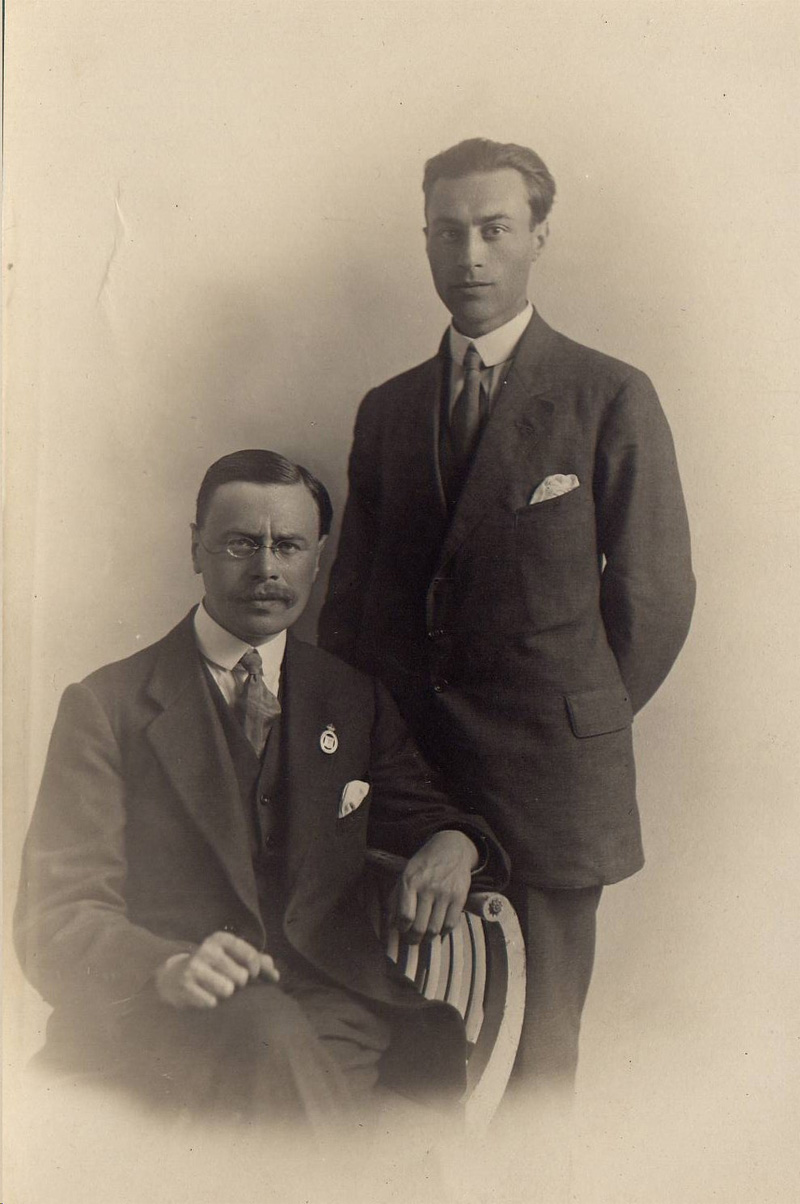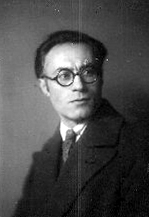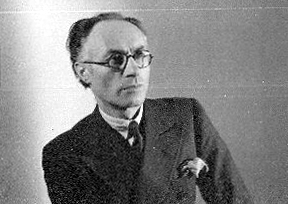
|
|
|
Jeannot Schotz (Later: Dr S.P. Schotz) and Benno Schotz
The brothers came from Estonia. Jeannot was born in Tallinn on 18 March 1882 (old or new style?), and Benno was born in Arensburg (now Kuressaare) Estonia on 28 August.1891 (Julian calendar). However, this latter date of birth may not be accurate, according to Benno Schotz on p14 of his memoirs.
Jeannot had shown an aptitude for chess as a young man and he later entered the 4th Baltic Tournament 1907, held in Riga. He took 1st place in Hauptturnier 'A' with a score of 6½/7, thereby qualifying for the Winner's Group, where he took third place with 2½/5. Overall, this was a fine performance, considering it was his first significant tournament.

Jeannot Schotz is seated third from left.
Photo: Wiener Schachzeitung 1908, page 96.
(Larger image)In 1907 Jeannot's name was found in a notebook in the pocket of a student who had been arrested. This could have had serious repercussions for Jeannot and his family, as the Government was still dealing with the circumstances of the 1905-7 Revolution, and it could have meant imprisonment or transortation to Siberia. Jeannot's father therefore arranged to have him smuggled out of the country. He first went to Germany, then sailed from Hamburg to Leith, Scotland, and onward to Glasgow where a few relatives who had emigrated earlier already lived.
Jeannot, who had been a gold medal student at His Gymnasium (High School) in Pärnu before going on to Riga University, continued his studies at the Glasgow and West of Scotland Technical College (after 1912 with the prefix Royal). He became a member of the Bohemian Chess Club in Glasgow, a club that had been founded in 1905. Jeannot was active in club chess, and he also took part in the Scottish Championship 1909, where he scored an impressive 7/11, in a tournament that featured a number of experienced players, only 1½ points behind the winner.
Because of rules regarding the number of Jewish students in any given Russian university, together with regulations concerning military service, it was thought necessary that Benno should leave Russia to study abroad. He first went to Darmstadt, Germany, matriculating there on 27 October 1911.
Soon after, it was decided that Benno should visit Jeannot in Glasgow. The family had not seen Jeannot for four years [Benno's memories of this period may be mistaken], and feared that they may never see him again. It was thought that Benno would return from that visit with news of Jeannot's progress. Things did not turn out as planned, however. Jeannot, thinking to help Benno enter Britain, wrote a letter indicating that when Benno arrived in Glasgow he would attend the Technical College. Benno, thinking that this was his brother's express wish with regard to his future education, left Germany with the intention of remaining in Glasgow:
'...I had worshipped him from childhood, walked on tiptoe when he was about, trusted in his wisdom, and I would never have thought to counter his wishes.'
(page 43 of Benno's memoirs)Benno did indeed enrol in the Technical College, studying alongside his brother. He indicates that although he was trying to learn English, he had no problems with his classes, for the Techical College was more practical than theoretical. He also joined the Bohemian Chess Club.
Benno Schotz (left) and Jeannot. Taken in Glasgow, probably before WWI, when they were both members of the Bohemian Chess Club. Photo: courtesy of Alan Shotts, son of Jeannot.
Despite the family's worries about not seeing Jeannot again, he did make at least one visit back to Estonia, for it is recorded that he played against Nimzowitsch in a simultaneous display that the master gave in Parnü on 18 December 1910 (new style). The game is shown on page 128 of Aron Nimzowitsch: On the Road to Chess Mastery, 1886-1924, by Per Skjoldager and Jørn Erik Nielsen, McFarland, 2012.
In the autumn of 1912 Jeannot left Glasgow for Zurich, where he would obtain his doctorate in chemistry. By now he had chosen to call himself by his Hebrew name, Schachno, with a middle name of Peisach. The story behind this latter name, as told by Benno, is interesting:
'When my brother Pesach [Peisach] died in infancy, from meningitis, his death was never registered, forgotten perhaps, because at the time my father was away from home, although his birth had been registered. When the time came for his call-up to military service, my father could not produce him. To the authorities this could have meant that he had absconded, and father would have been in great trouble. So with some diplomacy Jeannot was saddled also with his younger brother's name, as at that time he was already a university student and had deferment from the army.'
From this point on, all references to his name seem to show Schachno Peisach Schotz, and it was with this name that he became a naturalised British subject, giving the oath of allegiance on 20 September 1916. At that time his address was shown as 8 Upper Bedford Road, London.
Schachno (left) and Benno. 'In this case again taken in Glasgow, just post WW1. My father is wearing the badge showing his service in the Ministry of Munitions....probably taken when my father was visiting Glasgow from London where I believe he was then living.' (Photo and comments courtesy of Alan Shotts.)
After passing his final Engineering exams, Benno Schotz was offered a position at John Brown's Shipyard, in the Mechanical Drawing office. In the evenings, Benno would take classes in modelling at Glasgow High School, and later at the Glasgow School of Art (he had been inspired by visits to the Art Gallery in Darmstadt, and the opportunities in Glasgow would only enhance the desire to follow Art as his life's work). He became a professional scuptor in 1923.
Benno Schotz in the 1920s.
Meanwhile, Benno was active in chess matters. Although he was a member of the Bohemian Chess Club and represented that club in various matches, he also played for the Glasgow Jewish Institute Chess Club. A few examples are:
In 1923 he played in the West of Scotland team versus the East (board 63 - his name is spelled incorrectly in the relevant article).
He played for Glasgow Jewish Institute CC when the club reached the final of in the Richardson Cup 1928.
In September 1933 he is listed as a member of the Bohemian CC 1st team pool.
In 1935 he represented the Bohemian CC in the Richardson Cup competition, playing in the qualifying rounds and the semi-final, in which the club lost to Glasgow CC.
Writing about his chess activities in his Memoirs, Benno said:
'Schachno was a brilliant chess player. I had also learned the game when very young, and had studied it in Pärnu, but I played only occasionally. My brother was a member of the Bohemian Chess Club, who had their rooms in The Eldon, a tearoom at the top of Renfield Street, near Sauchiehall Street. [Eldon Café, 94 Renfield Street - AMcG]. It disappeared long ago. He was placed in a special category, Class A1 all by himself. There was a time when he considered taking it up professionally, but decided that chess was only a game. Naturally, he introduced me to his chess club, where my speech did not matter, only the quality of my play. Let me warn artists against taking up chess. It is a thief of time. I must have wasted years of my life in the chess club...I used to play for the Bohemians in competitive matches, but my chess stopped suddenly with the outbreak of war in 1939. I had to give it up, for I had no more time for it. I had taken stock of my priorities.'
Peter Anderson, who joined the Bohemian CC in 1928, has written fondly of his time at the club in his Reminiscences.
Benno Schotz in the 1930s.
Benno would not be associated with the Chess world any more, but he continued to be successful in the Art world. He had exhibited his work since 1917 and held his first one-man show in Glasgow in 1926 and in London in 1930. He had been President of the Society of Painters and Sculptors in 1920, and in 1937 he was elected a full member of the Royal Scottish Academy. He would receive many other honours, including Sculptor in Ordinary for Scotland in 1963, and his art is represented in many major public and private collections, not only in Scotland but around the world.
Dr S. P. Schotz would continue his professional work in chemistry, but he retained his interest in chess. His son, Alan Shotts, recalled that:
'My father was almost addicted to chess...I remember him as always having his head in a chess magazine. He was Middlesex County Chess Champion in his early seventies and in the later 30's had been champion of the then very active Ealing chess club for four years in succession.'
Benno Schotz died in Glasgow on 11 October 1984.
Schachno Schotz died in Middlesex on 27 December 1965.
Sources:
Wiener Schachzeitung 1908, page 96.
London Gazette, 3 November 1916.
British Chess Magazine 1935, p 74.
Glasgow Herald, 21 January 1935, p 4.
Bronze in My Blood: The Memoirs of Benno Schotz. Gordon Wright Publishing, Edinburgh, 1981.
Alan Shotts, son of Schachno Schotz (photos).
Cherna Crome, daughter of Benno Schotz.
Alan McGowan
Updated 19/5/2020
|
|



